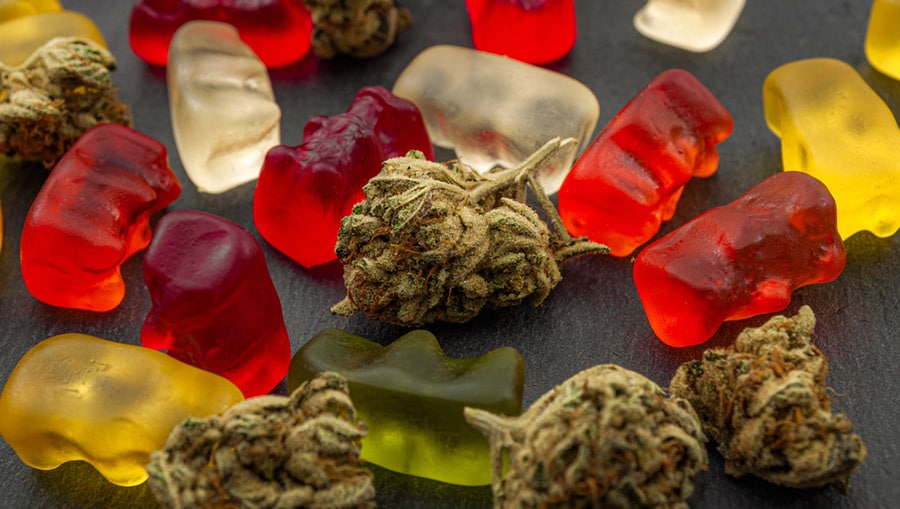How to Recover from Edibles
Since the legalization of recreational marijuana in many states, some people are turning to edibles as their preferred form of ingesting THC. Tetrahydrocannabinol (THC) is a chemical compound within the cannabis plant that produces a psychoactive effect in the brain. Giving users the pleasurable sensation of feeling “high.” Edibles are food or drink products that are infused with THC.
Unlike smoking a blunt or smoking a vape, edibles do not expose the user to the harmful side effects of smoking, often making it a more appealing option for users who are looking for that psychedelic and euphoric feeling. In addition to the fact that most edibles come in the form of sweet baked goods, it’s no wonder many are turning away from smoking THC in favor of a more appetizing alternative. The strength of edibles can also vary depending on the amount of THC that has been infused as well as the sensitivity of the individual consuming it.

Check Your Insurance Coverage for FREE
Find out if your insurance covers addiction treatment in minutes. We accept most insurance!
Edibles have become quite popular because they offer a different kind of “high” compared to the traditional form of smoking marijuana. When taking edibles, the process of THC entering the bloodstream happens at a much slower rate because the THC needs to be orally ingested first before being absorbed into the body. This means it takes a little bit longer for the psychoactive effects to occur and when it does, it will produce an intense and longer-lasting high. It can take anywhere from 30 minutes to 2 hours for the effects of an edible to kick in and the resulting high can last anywhere from 4-12 hours.
Because of this, users are much more prone to overdosing. The delayed effects make users believe they have not taken enough and therefore proceed to eat more edibles, which only intensifies the psychoactive properties when it is finally processed in the brain. First-time users of edibles and THC-infused products are also more susceptible to experiencing an overdose as they are unaware of how much they have taken and unsure of how their bodies will react to the substance.
Reach out to Hotel California by the Sea
We specialize in treating addiction and other co-occurring disorders, such as PTSD. Our Admissions specialists are available to walk you through the best options for treating your addiction.
So what happens when you overdose on edibles? What are some of the side effects of an edible overdose? Consuming too much THC can lead to some very unpleasant side effects including:
- Chest pain
- Rapid heartbeat
- Nausea and vomiting
- Severe anxiety and panic attacks
- Paranoia and fear
- Hallucinations
- Impaired mobility and coordination
Some users who consume edibles can also experience, what is known as an edible hangover. The uncomfortable feelings after you have consumed edibles and they have finally made their way out of your system are the aftermath of consuming THC. Though not an official diagnosis, edible hangover symptoms can include fatigue, lethargy, brain fog, dry eyes and mouth, headaches and mild nausea. When exploring options on how to recover from edibles, one of the most effective ways to alleviate the symptoms is to stay hydrated and maintain a balanced and nutritious diet. Similar to treating an alcohol hangover, rest, drinking lots of liquids, avoiding caffeine and having some food in your stomach can help alleviate the symptoms of an edible hangover.
When an individual continues to consume THC products and is unable to stop despite experiencing negative side effects, they made need help from a professional behavioral health provider such as Hotel California by the Sea. As one of the leaders in marijuana abuse treatment, Hotel California by the Sea provides clients with substance detox and specialized substance use disorder therapies such as CBT and DBT. With the help of various therapies including family therapy, individuals who are suffering from marijuana use disorder can receive the appropriate treatments to fit their individualized needs and recover from their dependence of marijuana use.
References:
https://happymd.org/blog/how-to-recover-from-medical-grade-edibles
https://www.onlinemedicalcard.com/blog/recovering-from-cannabis-edibles/
https://www.goodrx.com/classes/cannabinoids/can-you-overdose-on-weed-with-THC
https://www.medicalnewstoday.com/articles/effects-of-edibles
https://www.verywellmind.com/can-i-overdose-on-marijuana-4140975
